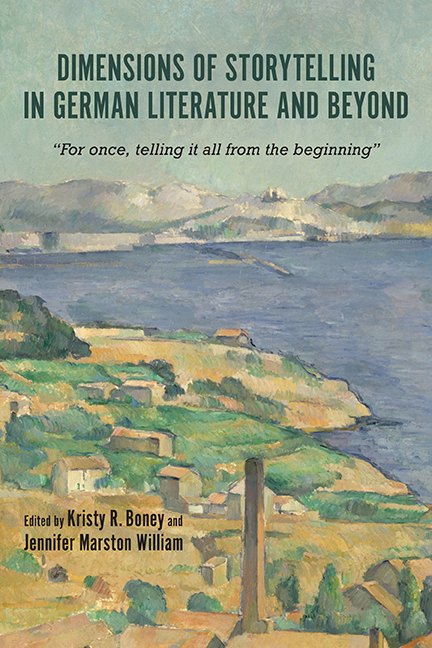 Dimensions of Storytelling in German Literature and Beyond
Dimensions of Storytelling in German Literature and Beyond Book contents
- Frontmatter
- Contents
- Acknowledgments
- Introduction: The Social, Political, and Personal Dimensions of Storytelling
- Part I Anna Seghers: A Missing Piece in the Canon of Modernist Storytellers
- Part II Expressions of Modernity: Using Storytelling Unconventionally
- Part III The Personal Narrative: Storytelling in Acute Historical Moments
- 14 Problems and Effects of Autobiographical Storytelling: Als Pimpf in Polen: Erweiterte Kinderlandverschickung 1940–1945 (1993) and A Hitler Youth in Poland: The Nazis’ Program for Evacuating Children during World War II (1998)
- 15 Too Near, Too Far: My GDR Story
- 16 Conflict without Resolution: Konrad Wolf and the Dilemma of Hatred
- 17 “Bleibt noch ein Lied zu singen”: Autobiographical and Cultural Memory in Christa Wolf's Novel Kindheitsmuster
- 18 Narrating germany's past: a story of exile and the return home—a translation of the chapter “above the lake” from ursula Krechel's Novel Landgericht
- 19 Storytelling in the GDR: An Interview with Eberhard Aurich and Christa Streiber-Aurich
- Notes on the Contributors
- Index
16 - Conflict without Resolution: Konrad Wolf and the Dilemma of Hatred
from Part III - The Personal Narrative: Storytelling in Acute Historical Moments
Published online by Cambridge University Press: 12 April 2019
- Frontmatter
- Contents
- Acknowledgments
- Introduction: The Social, Political, and Personal Dimensions of Storytelling
- Part I Anna Seghers: A Missing Piece in the Canon of Modernist Storytellers
- Part II Expressions of Modernity: Using Storytelling Unconventionally
- Part III The Personal Narrative: Storytelling in Acute Historical Moments
- 14 Problems and Effects of Autobiographical Storytelling: Als Pimpf in Polen: Erweiterte Kinderlandverschickung 1940–1945 (1993) and A Hitler Youth in Poland: The Nazis’ Program for Evacuating Children during World War II (1998)
- 15 Too Near, Too Far: My GDR Story
- 16 Conflict without Resolution: Konrad Wolf and the Dilemma of Hatred
- 17 “Bleibt noch ein Lied zu singen”: Autobiographical and Cultural Memory in Christa Wolf's Novel Kindheitsmuster
- 18 Narrating germany's past: a story of exile and the return home—a translation of the chapter “above the lake” from ursula Krechel's Novel Landgericht
- 19 Storytelling in the GDR: An Interview with Eberhard Aurich and Christa Streiber-Aurich
- Notes on the Contributors
- Index
Summary
IN THE COURSE OF A 1981 public discussion with Wolfgang Kohlhaase and Stephan Hermlin, organized to mark the fortieth anniversary of the German invasion of the Soviet Union, former Red Army soldier Konrad Wolf fretted about the conflict-readiness of his nation's youth in this time of peace: “With [the consolidation of peace], however, goes the difficulty of making convincingly clear to succeeding generations that that which has been achieved must be defended.” To be sure, it should come as no surprise that conflict should have so colored Wolf's perspective: Although born in Germany in 1925, he spent ten formative years of his early life in Moscow, the Soviet Union having offered the entire Wolf family sanctuary after the National Socialists came to power in 1933. He went to school in Moscow and became a Soviet citizen in 1936, before enlisting in the Red Army at the tender age of seventeen and joining up with the political division of the 47th Army in March 1943. From just south of the Black Sea port of Novorossiysk in the Caucasus, the army's campaign took Wolf via Rostov on Don into the Ukraine and then Poland, on into Germany at the beginning of March 1945, and finally to Berlin.
For Wolf, conflict had played a crucial role in the formation of that principled standpoint that had proved decisive in the military defeat of Nazi Germany; it was in conflict that the roots of the very identity of the GDR were to be found. This view is hardly surprising, given that through his father Wolf knew many of the other political exiles in Moscow who had fought in the Spanish Civil War and then worked alongside the Red Army during the war years, and finally, beginning in April 1945, returned to Germany to start the work of creating the new socialist state. In his wartime diaries, which he wrote in Russian, he writes of visiting such future GDR luminaries as Willi Bredel, Walter Ulbricht, and Erich Weinert (entry of December 23, 1943). Following the founding of the state, conflict remained just as decisive in preserving the gains made by the state in the face of constant provocation from the West.
- Type
- Chapter
- Information
- Dimensions of Storytelling in German Literature and Beyond“For once, telling it all from the beginning”, pp. 209 - 220Publisher: Boydell & BrewerPrint publication year: 2018


